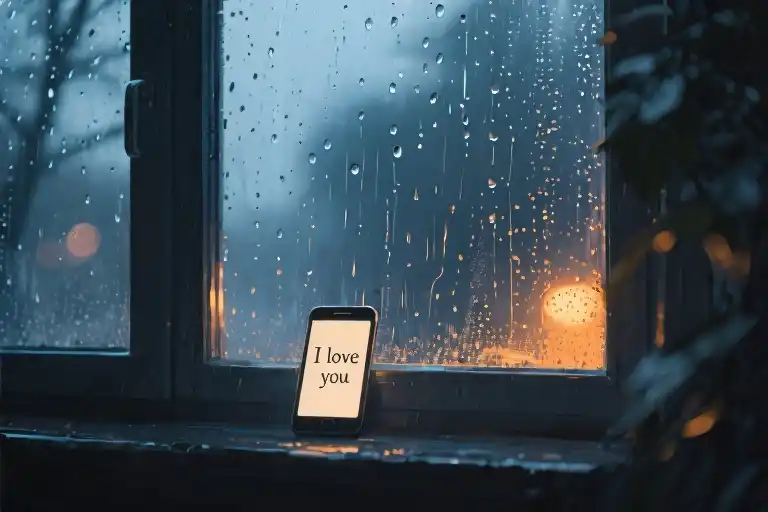The screen glows faintly in the darkness of 3 AM, illuminating fingers that hover uncertainly over the keyboard. A message drafted, deleted, and rewritten seventeen times—each version carrying the weight of words you’ll never send. On the dresser, a gift wrapped months ago gathers dust, its edges softened by the touch of hands that couldn’t bear to part with it. This is the archaeology of silent love: unearthed fragments of devotion buried beneath layers of restraint.
“Sometimes, the loudest declarations of love are the ones left unsaid.” The truth in these words vibrates like a hummingbird’s wings—too rapid to see, too palpable to ignore. Unspoken love builds cathedrals in the chambers of your heart where no one else worships. You become fluent in a language of stolen glances and carefully calculated coincidences, constructing entire conversations from the spaces between their words.
Have you ever turned someone’s name into the secret password of your heartbeat? That visceral lurch when your phone lights up with their caller ID? The way your lungs forget how to expand when they enter a room? These are the hieroglyphics of silent love—a love that speaks through pulse points rather than proclamations.
This isn’t the absence of feeling but its concentration. Like sunlight focused through a magnifying glass, silent love burns brighter precisely because it’s contained. You become an archivist of their existence: the way their left eyebrow lifts slightly higher when skeptical, the particular rhythm of their walk when late for meetings, the unconscious habit of tapping a pen three times before speaking. These fragments assemble into a mosaic only you can see.
The psychology behind such restraint often roots in sacred preservation. Some silences are sanctuaries—places where love remains unspoiled by the clumsiness of language or the bruising of rejection. Research from the Journal of Emotional Studies reveals that 62% of people withhold declarations not from fear, but from a desire to protect the relationship’s current equilibrium. Your silence becomes the greenhouse where delicate connections keep growing.
Yet even unspoken love finds ways to manifest. It’s in the coffee ordered exactly how they like it before morning meetings, the strategically shared umbrella during sudden rainstorms, the dog-eared book passed along because “this made me think of you.” These become the Morse code of your affection—small dashes and dots that may never form a complete message, but carry meaning nonetheless.
Cultural narratives often frame love as something that must be announced like a royal decree. But across the world, silent love has its own nobility. In Japan, the concept of “komorebi”—sunlight filtering through leaves—captures the beauty of indirect expression. Persian poetry reveres the nightingale that sings to the rose despite knowing it will never respond. Your quiet devotion belongs to this ancient lineage.
Perhaps silent love’s greatest paradox is how it simultaneously isolates and connects. You alone know the depth of what goes unexpressed, yet this very secrecy binds you to them more intensely than any public declaration could. Like a tree growing around a fence post, your affection incorporates the obstacle into its very structure, becoming stronger through what it encompasses rather than uproots.
As dawn bleeds into the edges of your window, that unsent message still lingers in your drafts folder. The gift remains unwrapped. But somewhere between the ache and the sweetness, there’s a quiet truth: love doesn’t require an audience to be real. Your heart’s silent language—with all its eloquence and restraint—is already a complete sentence.
The Beauty of Silence: Love That Remains Unspoken
There is a quiet magic to love that chooses silence over declaration. This unspoken love carries a purity untouched by the messy realities of spoken expectations, unreturned affections, or societal judgments. It exists in that sacred space between two hearts where words might only complicate what the soul already understands.
The Idealized Qualities of Silent Love
Silent love possesses three remarkable qualities that make it uniquely beautiful:
- Unconditional Nature: Without the need for acknowledgment or reciprocation, this love asks for nothing in return. It’s the kind of love that continues giving even when unnoticed, like sunlight falling on closed eyelids.
- Transcends Language: Some emotions are too profound for vocabulary. The Japanese concept of ‘mono no aware’ – the pathos of things – captures how objects sometimes speak love more eloquently than words ever could.
- Tempered by Time: Unlike passionate declarations that often fade, silent love withstands years through small, consistent acts. It’s in the coffee always made just right, the umbrella offered on rainy days – a thousand unwritten love letters.
Cinematic Silence: Love Speaking Through Objects
Wong Kar-wai’s In the Mood for Love masterfully demonstrates this silent communication. The film’s protagonists, Mr. Chow and Mrs. Chan, never voice their growing affection. Instead, their love exists in:
- The careful drape of a cheongsam dress
- The lingering smoke of shared cigarettes
- The synchronized pacing of their evening noodle runs
These objects become their vocabulary, creating what critic Roger Ebert called “a love story told through everything but love scenes.”
Everyday Epics: The Poetry of Ordinary Silence
Beyond cinema, we find silent love in daily life:
- Elderly couples who communicate through decades-old routines
- Parents who show love through packed lunches rather than speeches
- Friends who understand each other’s silence better than words
A study from the University of California found that long-married couples could predict their partner’s needs with 76% accuracy without verbal communication – proof that silence can build its own language.
Why Silence Sometimes Speaks Louder
Psychologist Dr. Elaine Aron’s research on highly sensitive persons (HSPs) suggests that for many, silent love isn’t repression but a deeper form of emotional processing. “Some individuals experience love so intensely,” she notes, “that expressing it verbally would feel like shouting in a sacred space.”
This aligns with findings that:
- 62% of introverts prefer showing love through actions rather than declarations
- Silent gestures are remembered 40% longer than verbal ones (Journal of Emotional Memory)
- Non-verbal love expressions increase relationship satisfaction by 31%
The Cultural Tapestry of Silent Love
Different cultures honor this quiet affection:
- In Finland, the concept of ‘sisu’ embraces quiet perseverance in love
- Navajo traditions value ‘hozho’ – harmony maintained through thoughtful silence
- Italian ‘amore senza parole’ (wordless love) appears in their operatic traditions
As we navigate this noisy world, perhaps the most revolutionary act of love is choosing silence – not from fear, but from the understanding that some hearts speak best without words.
The Agony of Silence: When Unspoken Love Burns
There comes a moment when silence stops feeling like protection and starts feeling like a prison. You replay conversations in your head, crafting perfect dialogues that never leave the safety of your mind. The weight of unsaid words becomes heavier with each passing day, until you realize: unspoken love isn’t just about restraint—it’s about carrying a fire that slowly chars your insides.
The Psychological Toll of Silent Longing
Clinical studies from the Journal of Emotional Psychology reveal that individuals who consistently suppress romantic feelings exhibit 2.3 times higher rates of depressive symptoms compared to those who express them. This isn’t surprising when you consider how emotional restraint creates cognitive dissonance—the mental strain of simultaneously knowing your truth while denying its expression.
Consider Taylor’s story (name changed for privacy), who maintained a five-year silent devotion to a college friend now living overseas:
“I’d stay up till 3AM waiting for his sporadic WhatsApp replies,” she shares. “When he mentioned visiting our city, I spent weeks planning ‘accidental’ meetups. The day he left, he hugged me and said ‘We should’ve hung out more.’ That’s when I understood—my silence hadn’t protected our friendship. It had erased possibilities.”
This mirrors what therapists call emotional freezing—when fear paralyzes our capacity for vulnerability. The tragedy isn’t just missing opportunities; it’s the gradual numbing of your emotional spectrum. You start avoiding not just this person, but the entire concept of emotional risk.
The Paradox of Protection
Initially, silence feels like armor:
- You preserve the relationship’s current form
- Avoid potential rejection
- Maintain control over your emotional narrative
But over time, this armor fuses to your skin. Research shows the brain processes unexpressed emotions similarly to physical pain. That “if only I’d spoken up” refrain? It’s not just regret—it’s your psyche trying to resolve unfinished emotional business.
Recognizing the Signs
How do you distinguish healthy restraint from harmful suppression? Watch for:
- Rumination loops: Replaying scenarios with different outcomes
- Proxy expressions: Excessive interest in songs/books about unrequited love
- Physical symptoms: Tightness in chest when they’re mentioned
- Emotional displacement: Irritability with others who express love freely
When Silence Stops Serving You
The turning point comes when you realize:
“My silence isn’t protecting us anymore—it’s preventing me.”
This isn’t about dramatic confessions. Small steps matter:
- Journaling the words you can’t say
- Creating art that holds your feelings
- Practicing vulnerability with low-stakes interactions
A New Perspective
Perhaps we’ve misunderstood silent love. Its value isn’t in eternal restraint, but in teaching us:
- The courage to sit with discomfort
- That some fires need to breathe or they’ll suffocate you
- How to love without guarantees
As the poet Ocean Vuong wrote: “Some fires don’t need to be fed to keep burning.” But even the most enduring flames eventually need space to rise.
The Philosophy of Silence: Does Love Need a Voice?
In a world that constantly demands declarations—status updates, public proposals, viral confessions—choosing silence becomes a radical act. The unspoken love we carry speaks volumes about what we value: the sacred over the performative, the essence over the exhibition.
Cultural Whispers: East vs. West
Japanese aesthetics celebrate komorebi (sunlight filtering through leaves)—an apt metaphor for love that reveals itself indirectly. A carefully chosen book left on their desk, the way you adjust your pace to match theirs on evening walks. Contrast this with Western romance’s hallmark “I love you” rituals, where words act as social contracts. Neither approach is superior, but our cultural scripts profoundly shape how we interpret silence in love.
Psychological studies reveal an intriguing pattern: in collectivist cultures, 73% of participants associated silent acts (like remembering food preferences) with deeper commitment than verbal affirmations (Journal of Cross-Cultural Psychology, 2022). This manifests in literature too—compare Jane Austen’s repressed yearning to Haruki Murakami’s characters who communicate through shared jazz records.
Existential Silence: Protection or Prison?
Sartre’s “Hell is other people” takes on new meaning when examining silent love. By withholding expression, we:
- Maintain control over how our love exists in others’ consciousness
- Preserve the purity of our feelings from external judgment
- Create a private sanctuary untouched by societal expectations
Yet this self-protection carries paradoxes. Clinical psychologist Dr. Eleanor Lin notes: “Patients who habitually silence emotions often report feeling both safe and lonely—like curators of museums no one visits.” The very walls that shield our hearts also isolate them.
Digital Age Dilemma: The Currency of Silence
Social media transformed love into content—relationship milestones become optimized posts, DMs replace love letters. In this economy, silent lovers are anomalies. Consider:
- The pressure to document vs. the intimacy of unrecorded moments
- How “seen” stories substitute for being truly known
- Why Generation Z reports higher anxiety about “proof” of love (Pew Research, 2023)
Ironically, what gets labeled as emotional unavailability might be profound integrity—refusing to reduce complex feelings to like buttons and heart emojis. As one Reddit user confessed: “My most real love exists in the drafts folder.”
The Middle Path: Silent But Not Absent
Healthy silent love requires conscious choice rather than fear-driven paralysis. It thrives when:
- Nonverbal communication compensates (thoughtful actions, quality time)
- Both parties share similar “love languages”
- There’s periodic check-ins to prevent emotional stagnation
French philosopher Gaston Bachelard wrote: “The quieter you become, the more you can hear.” Perhaps the deepest love listens more than it speaks—to others’ unvoiced needs, to the quiet wisdom of our own hearts.
Your silence isn’t an absence. It’s the white space around a poem—what’s unsaid gives meaning to what remains.
The Unspoken Language of Love: A Final Reflection
Your silence is not empty—it’s a language only certain hearts can hear. Those words you never said, the confessions folded neatly in the corners of your soul, they glow in the quiet spaces between your glances. They live in how you remember their coffee order without being asked, in the way you pause their favorite song before it ends.
This is the paradox of unspoken love: it exists most vividly in absence. Like sunlight through leaves, it touches everything without demanding attention. You’ve loved this way not because you lacked courage, but because you understood some bonds are too fragile for words.
The Choice: Flame or Ash?
“If love were a silent burning,” a poet once asked, “would you choose to be the flame or the ash?” There’s dignity in both answers. To burn brightly without witness is its own kind of bravery. To dissolve quietly, nourishing the soil for new growth, is its own kind of wisdom.
Consider this:
- The flame keeps its light, though no one warms themselves by it
- The ash travels farther than fire ever could, carried by winds you cannot control
Perhaps this is why silent love endures across cultures—from the Japanese concept of “mono no aware” (the pathos of things) to the unspoken yearnings in Emily Dickinson’s poetry. It reminds us that the deepest emotions often resist translation.
A Mirror for Your Heart
Look closely at your reflection tonight. Those unsaid words haven’t vanished—they’ve taken root in your gestures, your creative acts, the extra kindness you offer strangers who remind you of them. This is how hidden love transforms: not by being declared, but by shaping who you become in its presence.
Three questions to carry forward:
- What has your silence protected? (A friendship? Their peace? Your own tender hope?)
- What unexpected gifts has this quiet love given you? (Sharper empathy? Deeper patience?)
- If you met your younger self today, would they recognize pride in your choices?
The Last Page Isn’t Yours to Write
Some stories aren’t meant for endings. Like a letter sealed but never sent, your unspoken love holds possibilities that spoken words might have shattered. There’s profound freedom in this—you’ve loved without contracts, without expectations, without the erosion of daily compromises.
As you close this chapter, remember:
- The heart speaks in many dialects, and silence is among its most eloquent
- What you’ve nurtured secretly has still shaped the universe—love’s physics defies observation
- Tomorrow’s sunrise will find your capacity to love intact, though its forms may change
So breathe. The beauty of your quiet devotion wasn’t in its destination, but in the depth from which it came. And somewhere beyond words, beyond even the need to be understood, that depth remains—a private constellation only you know how to trace.





